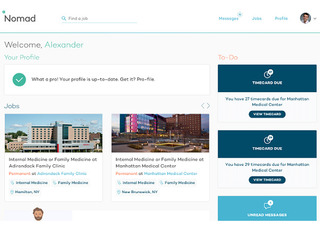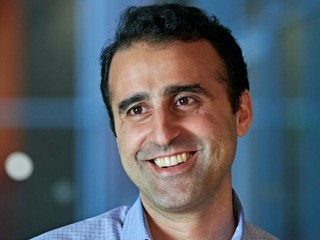
Healthcare staffing platform Nomad Health raises $22M, appoints new CEO
Justin Lambert, the company's President and COO, will be taking the reigns
 The National Center for Health Workforce Analysis (NCHWA) projects a nationwide shortage of nurses, including nearly 338,000 registered nurses (RNs) and over 99,070 licenses practical nurses (LPNs). In addition, in 2036, there is a projected shortage of 14% for RNs in nonmetropolitan areas while there is a projected shortage of 8% for RNs in metropolitan areas.
The National Center for Health Workforce Analysis (NCHWA) projects a nationwide shortage of nurses, including nearly 338,000 registered nurses (RNs) and over 99,070 licenses practical nurses (LPNs). In addition, in 2036, there is a projected shortage of 14% for RNs in nonmetropolitan areas while there is a projected shortage of 8% for RNs in metropolitan areas.
Nomad Health is an online marketplace for healthcare jobs, addressing the staffing crisis by working with both clinicians and healthcare facilities to match employees and employers looking for freelance work.
On Monday, the company made two big announcements: first, it unveiled that it raised $22 million in a round led by HealthQuest Capital, along with Adams Street, Icon Ventures, Polaris Partners, .406 Ventures, and RRE Ventures. This is the company's first funding since it raised $105 million in June 2022, and it brings Nomad's total capital to $240 million.
The second piece of news is that the company appointed Justin Lambert as its new chief executive officer, replacing Alexi Gharib Nazem, MD, who will remain on the Nomad Health Board of Directors.
Prior to becoming CEO, Lambert was president and chief operating officer of the company, overseeing operations, marketing, and client services. To replace him as COO, Nomad has appointed Justine Lelchuk, senior vice president, operations.
“For nearly a decade, Nomad has been spearheading the next generation of healthcare staffing with the introduction of new technology and unprecedented promises of transparency and efficiency. The company’s demonstrated ability to consistently deliver for clinicians and clients has earned it the right to keep innovating and pushing the industry forward,” Lambert said in a statement.
“I am grateful and excited to be appointed CEO by our board and to have the opportunity to help Nomad bring its novel approach and leading technology to more people in more ways.”
When a clinician uses Nomad, they express their preferences, such as location, salary and the hours they can work. They can also share information about their background qualifications, such as where they went to med school, where they did their residency, and their board certifications. At the same time, healthcare facilities are able to post their jobs to Nomad, with specifications regarding salary, experience and certain certifications. They will be immediately presented with candidates that match exactly those qualification but also who have expressed those preferences.
Once the two sides are matched and agree to terms, the contracting happens electronically on the Nomad platform. Once the clinician starts working, all of the time management and payments also happen electronically through the platform.
While, in some ways, Nomad acts like a typical job recruiting site, in the vein of LinkedIn or Monster, the company is different because it puts its focus on the unique problems that occur only in the healthcare space.
For example, to practice medicine or nursing in a specific state, professionals need to have a license to practice in that state, and a separate license is required for each state. So, Nomad helps by finding clinicians that already have the correct state licenses to make the recruiting process go quicker, while also providing license verification against versus public databases to ensure that the licenses are real and up to date.
To start, Nomad worked exclusively with travel nurses, who go from gig to gig, traveling around the country taking different jobs. The company has since expanded its services to a large group of allied health professionals, including laboratory technicians, physical therapists, and ultrasound technicians. To date, it has allowed thousands of healthcare facilities in all 50 states to connect with more than 300,000 travel nurses and allied health professionals to fill roles at a 94% on-time start rate.
Nomad says it will use the new funding round to expand its product portfolio and meet the continued demand for its staffing-enabling technology.
“We founded Nomad in 2015 to bring innovation to the large but antiquated healthcare staffing market. In the last nine years, Nomad has led the industry through a technology transformation and set new standards for service, transparency, and experience for clinicians and clients alike,” said Nazem in a statement.
“As Nomad continues to pioneer important new frontiers in healthcare workforce management, I am enthusiastic for Justin to take Nomad to the next level.”
(Image source: nomadhealth.com)
Related News




